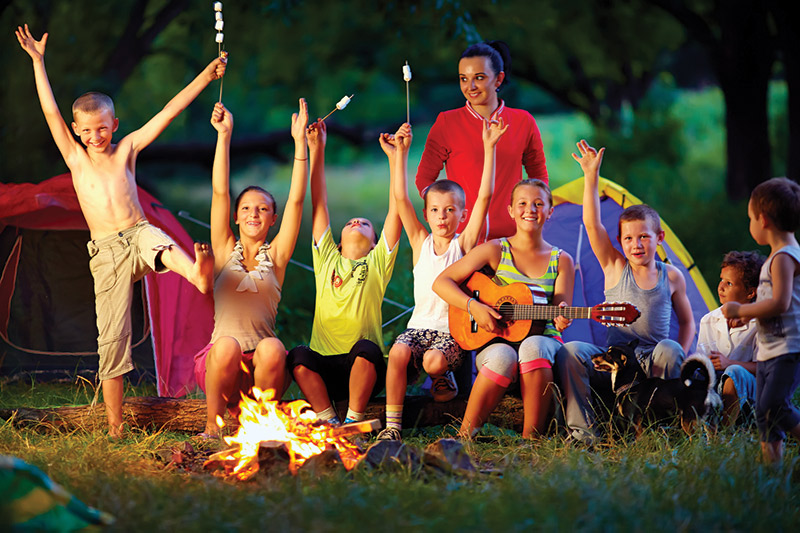As access to technology and online material becomes easier, less and less children are spending time outdoors for play or education. In an Ohio study conducted in 2016, researchers found that more than 50% of children were spending less than 23 minutes outdoors daily, while a staggering 1/3 of students spent no time outdoors. These figures are distressing, as there have been many proven benefits to outdoor playtime and outdoor education.
Camp Shohola is a boy’s summer camp located in Greeley, PA founded in 1943, and has been run by the Barger family since. Their goal is to provide a happy and safe environment where each camper has a fun, positive experience, and is able to mature and expand their boundaries. Camp Shohola believes that outdoor education is an important component and helps bring it to boys around the country every summer.
Outdoor Skills
The well-known adage, “See one, do one, teach one,” holds true in outdoor education. At Camp Shohola, boys learn essential outdoor skills in a fun and educational manner. In various outdoor skill books, education books, and even in research studies, it has been shown time and time again that learning outdoor skills through activities and experiences is the single greatest way of learning.
Through structured and unstructured activities such as camping, hiking, and survival classes, children are able to learn the essentials of outdoor living, whilst at the same time gaining a better appreciation for the outdoors in general. Simple skills such as compass use and gardening that can be used in day-to-day life, while skills such as using the sun for timekeeping, moss tracking, and fire-starting, are ones that children carry with them for a lifetime.
Self-esteem and Self-reliance
Outdoor education helps children become self-reliant as they learn how to complete various tasks and activities. In a study done out of Kansas in 1983, it was found that boys with previously diagnosed behavior problems became more self-reliant after partaking in three two-week wilderness hikes.
While partaking in various outdoor activities, children learn to trust in their instincts, and this carries forward for their lifetime. Outdoor activities also challenge children both physically and mentally helping them realize their true potential, which in turn helps greatly boost self-esteem and confidence.
Better Health
Structured outdoor education helps children get out of the house and away from screens and technology. It allows children to explore their surroundings with all their senses, giving them the opportunity to get some physical exercise.
As the childhood obesity epidemic rises, children are increasingly encouraged to spend more time outdoors. Outdoor education also helps educate children on how to be safe and prevent and treat injuries. Many children suffering from asthma or other airborne illnesses also see improvement with spending more time outdoors. At Camp Shohola, even a two-week experience can help bring about a very positive impact among children.
Increasing Communication Skills
Many outdoor activities rely heavily on teamwork and problem solving, helping children improve both their communication and leadership skills. Activities such as camping and hiking require children to initiate discussions, work through conflict, and manage tasks that they may not otherwise encounter.
At Camp Shohola, boys learn to rely on each other for support and learn to voice their ideas and concerns in a safe space. In a 2006 study, it was found that being outdoors increases the chances of communication over traditional education methods.
Better Grades
Over the years, many studies have been done that show that there is an increase in school performance and grades through outdoor education. It has been found that standardized test scores, attendance, and children’s attitudes towards school are all positively impacted when they have the means to take part in outdoor learning. It has been postulated that this correlation occurs due to the hands-on learning experiences, and the gratitude that children gain in seeing the value of education firsthand. It has also been found that a child’s cognitive abilities are greatly enhanced and develop better when outdoor education is included.
Mental Health
It has been found that outdoor education leads to decreased levels of stress, and increased amounts of concentration in children. Scientifically, hormones such as serotonin and dopamine are released more when outdoors and completing tasks, helping children feel less anxiety and stress.
Nature itself has been proven to help with stress levels in both children and adults, with studies done in 2014 and 2015 in Japan showing lower levels of cortisol, the stress hormone, in those that took nature walks over urban walks. In another study conducted in 2009 on children with ADHD (attention deficit hyperactivity disorder), it was found that concentration and attention were greatly improved in those children taking a 20-minute greenery nature walk than those in a quiet urban setting. These both come with the added advantage of increased memory and cognitive abilities as well, helping further show the importance of outdoor education.
Camp Shohola’s Final Thoughts
Undeniably, there are many positive effects of outdoor education for children. The best part about the aspects that have been outlined is that children can carry these habits and skills that they pick up through outdoor education with them to adulthood.
Camp Shohola notes that most of the time, people remember and retain what they have learned through practical and hands-on knowledge more than theoretical knowledge. As a result, it is important to instill practical knowledge on children at a young age.

